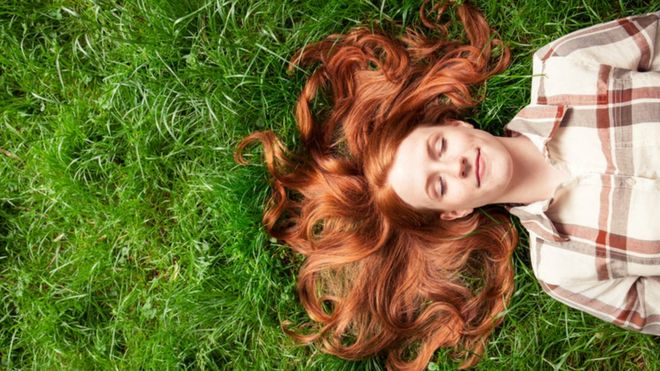 People can carry a "silent" red hair gene that raises their risk of sun-related skin cancer, experts warn.
People can carry a "silent" red hair gene that raises their risk of sun-related skin cancer, experts warn.
The Sanger Institute team estimate one in every four UK people is a carrier.
The gene's effect is comparable to two decades of sun exposure in terms of cancerous changes, they say.
While people with two copies of the gene will have ginger hair, freckles and pale skin and probably know to take extra care in the sun, those with one copy may not realise they are at risk.
Around 25% of UK adults have one version of the gene called MC1R which increases their risk of malignant melanoma.
These carriers may not always look like "easy burners", say the researchers - but they are.
Although not true redheads, they will have pale skin and some freckles and are prone to sun damage. Their natural hair colour can range from brown through to blond, sometimes with a hint of red.
The researchers looked at more than 400 tumour samples from patients who had been diagnosed with melanoma.
They found that the patients who had at least one copy of a genetic variant of MC1R had 42% more sun-associated mutations in their cancers than individuals without these variations - equivalent to the toll of an additional 21 years in the sun.
The findings, in Nature Communications, suggest that people with the red hair gene are naturally less able to protect themselves from the sun's damaging UV rays.
MC1R provides instructions for cells that produce a pigment called melanin, which is what makes skin go brown to protect it from UV damage.
The red hair gene version of MC1R does not offer much tanning or sun protection.
Lead researcher Dr David Adams, from the Wellcome Trust Sanger Institute, said the findings reinforced the message that people need to be sun aware.
"All people, not just pale redheads, should be careful in the sun.
"It has been known for a while that a person with red hair has an increased likelihood of developing skin cancer, but this is the first time that the gene has been proven to be associated with skin cancers with more mutations.
"Unexpectedly, we also showed that people with only a single copy of the gene variant still have a much higher number of tumour mutations than the rest of the population."
Dr Julie Sharp of Cancer Research UK said: "For all of us the best way to protect skin when the sun is strong is to spend time in the shade between 11am and 3pm and to cover up with a T-shirt, hat and sunglasses.
"Sunscreen helps protect the parts you can't cover - use one with at least SPF15 and four or more stars, put on plenty and reapply regularly."
Skin type and risk
Michelle Roberts - BBC Health News